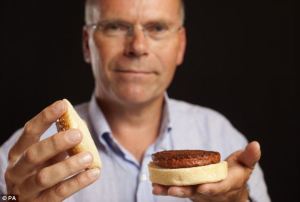
It's taken around a quarter of a million pounds, but the world's first artificially grown burger has been grown, moulded in to a patty, cooked and eaten. As burgers go it's expensive, and I'd rather have a wagyu burger than a vat grown one, but that's just me.
The burger was grown in strips from stem cells in a nutrient broth nd stimulated with electricity. It took 20,000 such strips, 200pieces of lab grown animal fat, salt, egg powder, and breadcrumbs, and red beetroot juice and saffron (to provide authentic beef colouring) to make the burger.
When asked if he'd feed it to his children, the creator said he had a patty to take home for them.
As to the taste test, well, two people ate the burger, and they seemed to approve, giving comments of; ‘The absence is the fat. But the bite feels like a conventional hamburger. What was conspicuously different was flavour.’ and 'It's close to meat. It's not that juicy. The consistency is perfect (but) I miss salt and pepper!'
The real question is - Was it worth it or was it just a publicity stunt?
Well, if the process can be replicated and be made able to mass produce these burgers on a much cheaper scale then yes it probably was worth it as it could give hope for food to areas blighted with poverty and drought.
Also it could possible be marked commercially as a cruelty free, and possible environmentally friendly, meat which could open it up to vegetarians and vegans who follow their path because of animal cruelty.
The scientists behnd it also claim that vat grown burgers would use 55% the energy of naturally farmed beef, produce just 4% of the greenhouse gases, and take up only 1% of the land use. Sounds like a win doesn't it.
How many farmers would it put out of business though?
What are the long term effects of eating 'meat' that's been vat grown in an accelerated manner, and so not naturally developed?
The sheep that had been cloned, Dolly, had to be put down because it developed lung disease and arthritis. Dolly was killed as just six years of age, her breed have alife expectancy of 11 - 12 years. We don't know for sure if Dolly's premature death was a result of the cloning (the sheep she was cloned from was 6 years old and some theorise her DNA was thus 6 years old), or the fact that for security reasons she had to be kept indoors, and contracted a disease that affects sheep kept thusly. Several other sheep in the heard also contracted the lung disease.
I know comparing a cloned sheep to vat grown meat for consumption is a stretch but I do have concerns for the long term effects, much the same as I do for GMO foods. I won't go into the whole Monsanto rant because that would be a whole other blog post, but again there are potential parallels, and being effectively a manufacturong process who's to know what else would / could be added in to man-made meat, especially when even natural meat get cross-contaminated with other meats - yes I'm referring to the horsemeat scandal over here in the UK last year.
Now that the financial backer for this being revealed as Sergy Brin, co-founder of google, I do wonder how much of this is going to become a for-profit project, but then I'm a huge cynic.
For me, the Jury's still out on the Frankenburger, I'll stick to normal meats thank you very much.
No comments:
Post a Comment